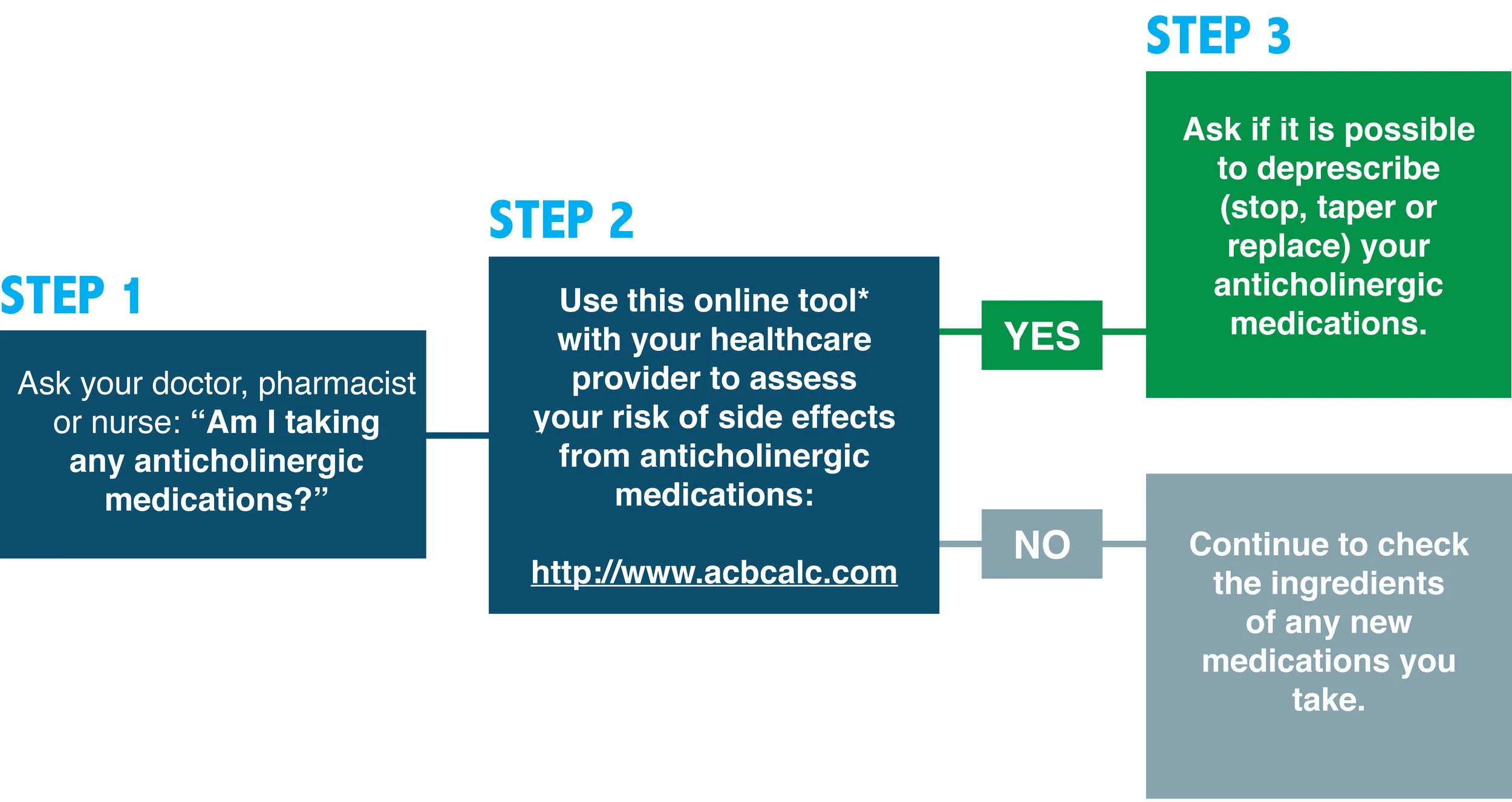What you need to know about anticholinergic medications
By Johanna Trimble and Janet Currie
Click here to download a printable version of this article
What are anticholinergic medications?
Some medications you take for allergies, sleep, nausea, depression or incontinence belong to a group of medications called anticholinergic medications. They work by blocking a chemical in your body called acetylcholine. Acetylcholine is used in many parts of your body and helps you stay alert, keep a steady heart rate, breathe, digest food, sweat and empty your bladder. When you take an anticholinergic medication, it acts on many parts of your body at the same time.
How do I know if I’m taking an anticholinergic medication?
Anticholinergic medications can be prescribed to you by your healthcare professional or bought over the counter (also called OTC) at a store without a prescription. Here are some of the most common types of anticholinergic medications.*
Allergy medications (for example, Benadryl® - diphenhydramine)
Anti-nausea medications (for example, Gravol® - dimenhydrinate)
Antidepressants (for example, Paxil® - paroxetine)
Antipsychotics (for example, Seroquel® - quetiapine)
Bladder control medications (for example, Ditropan® - oxybutynin)
Sleeping pills (for example, trazodone or OTC medications like Nytol® or Sominex®)
Muscle relaxants (for example, Robaxin® - methocarbamol)
All opioids
Combination medications (for example, Tylenol PM® or other medications with “PM” in their name which include the ingredient diphenhydramine)
*This list does not include all anticholinergic medications.
Did you know?
Strong anticholinergic ingredients can be found in many of the over-the-counter medications you buy. Always read the ingredient list on the package of any medications you buy over-the-counter. If there are two or more ingredients it is called a combination medication. A combination medication may have an anticholinergic medication in the ingredients list. For example, diphenhydramine or dimenhydrinate are strong anticholinergic medications found in many over-the-counter products.
Ask your doctor, pharmacist or nurse if the medications you are taking have anticholinergic effects.
Older adults are most at risk from anticholinergic medications. Why is that?
As we get older, our liver and kidneys aren’t able to process medications as well so we become more sensitive to them. Also, many older adults have more than one health condition and may take many medications including one or more anticholinergics. The more medications a person takes, the more likely it is that he or she will have unwanted side effects.
What are the side effects from anticholinergic medications?
When you take an anticholinergic medication, it can act on many different parts of your body at the same time. This can cause unwanted side effects. Your risk of side effects is higher if:
you are taking higher doses;
you take the medication for a long time;
you are taking more than one anticholinergic medication.
Anticholinergic medications have many different side effects. Side effects can appear at any time, even many years after starting a medication. As time passes, you may think new symptoms are a new illness, when in fact they are side effects from your medications. Below are a few common side effects of anticholinergic medications:
Does taking anticholinergic medications increase my risk of dementia?
A few studies have suggested that older adults who use anticholinergic medications for a long time or at higher doses may have a higher risk of dementia. Research has not proven this, but it does suggest that older adults should limit the number of anticholinergic medications they take and use the lowest dose for the shortest length of time.
How do I lower my risk of side effects from anticholinergic medications?
*The Anticholinergic Burden Calculator was developed to help health providers review a patient’s medication list to see if there are changes that could be safer for the patient. Visit the site at http://www.acbcalc.com/.
Always talk to your doctor, pharmacist or nurse before stopping or changing any medication.
References
1. Coupland CAC, Hill T, Dening T, Morriss R, Moore M, Hippisley-Cox J. Anticholinergic Drug Exposure and the Risk of Dementia: A Nested Case-Control Study. JAMA Intern Med. 2019;179(8):1084–1093. doi:10.1001/jamainternmed.2019.0677 https://jamanetwork.com/journals/jamainternalmedicine/fullarticle/2736353
2. King R, Rabino S. ACB Calculator. http://www.acbcalc.com
Janet Currie is a social worker who has been involved with patient and medication safety issues for over 17 years. She is particularly concerned about the safety and efficacy of psychiatric drugs and their impacts on seniors. She is a member of the core Executive of the Canadian Deprescribing Network, the past co-chair of the Canadian Women’s Health Network and was a two-term member of Health Canada’s Expert Advisory Committee on the Vigilance of Health Products. She owns and manages a website on psychiatric drug safety and has frequently testified to the Canadian Senate and the Parliamentary Standing Committee on Health on prescription drug surveillance and adverse drug effects. She is completing a Ph.D. on medication safety and off-label prescribing at UBC. Janet is Chair of the Patient Awareness Committee of the Canadian Medication Appropriateness and Deprescribing Network.
Johanna Trimble is a patient safety advocate and member of the BC Patient Voices Network. She is a member of the Geriatrics and Palliative Care Subcommittee of the Council on Health Promotion for Doctors of BC. As an honourary lecturer, she co-teaches first-year medical students at UBC in Community Geriatrics as well as pharmacy students on medication issues in Long Term Care. Johanna is an active member of the Patient Awareness Committee of the Canadian Medication Appropriateness and Deprescribing Network.




